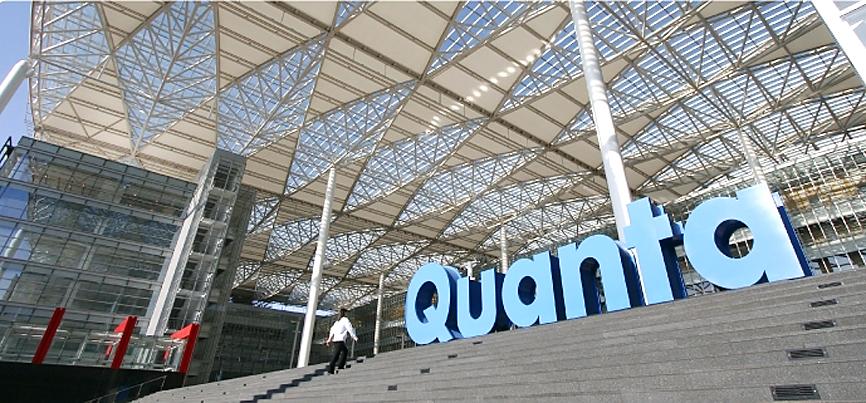Quanta Computer Inc (廣達電腦), which assembles MacBooks for Apple Inc, yesterday said its Chinese subsidiary has suspended production, the latest among Apple’s supply chain facing production disruptions as China sticks to its strict “zero COVID-19” policy.
The world’s biggest contract laptop computer manufacturer said in a filing with the Taiwan Stock Exchange that the subsidiary, Tech-Com (Shanghai) Computer Ltd (達功上海電腦), has halted production in response to the Shanghai government’s COVID-19 prevention measures.
The factory at the Shanghai Songjiang Export Processing Zone would resume operations when it receives notification from the local government, it said.

Photo: Screen grab from the company’s Web site
The impact of the Shanghai factory shutdown has yet to be determined. Quanta makes about 80 percent of the laptops at its manufacturing hub in Chongqing, Sichuan Province.
“Quanta is almost the sole EMS [electronics manufacturing service] supplier of MacBooks, so among Apple’s main products, the MacBook would be the most affected by Quanta’s production suspension due to China’s lockdowns,” TF International Securities (天風國際證券) analyst Kuo Ming-chi (郭明錤) wrote on Twitter on Tuesday.
Shanghai’s lockdowns might have a milder impact on iPhone and iPad production, which have multiplier suppliers, Kuo said.
Hon Hai Precision Industry Co (鴻海精密), a major assembler of iPhones, can help fill the shortfall due to production disruptions at Pegatron Corp (和碩) and Compal Electronics Inc (仁寶電腦), he added.
Compal said in a filing with the Taiwan Stock Exchange yesterday that five of its subsidiaries in Kunshan have adjusted operations in response to the local government’s COVID-19 measures.
Compal declined to comment on whether those subsidiaries have halted operations.
The lockdowns in Shanghai and Kunshan have disrupted transportation and worsened an uneven supply of key components, market researcher TrendForce Corp (集邦科技) said.
That means electronics manufacturers will have to rely on onsite component inventory for production, TrendForce said.
Quanta, Compal and Wistron Corp (緯創), another contract notebook computer maker, have stored key components, such as multilayer ceramic capacitors, for about three to four weeks of production, it said.
Mirle Automation Corp (盟立), an automation system supplier, yesterday said that the Shanghai lockdowns could cut revenue by at least 10 percent this year due to production and transportation disruptions.
“The impact will not be as significant as before,” Mirle chairman Sun Houng (孫弘) told investors.
“Fortunately, we have received a lot of orders since last year,” he said.
Mirle said it has received more than NT$10 billion (US$343.81 million) in orders, the highest in three years, which translates into shipments through next year.
The company is adjusting its customer portfolio to minimize the impact from lockdowns in China by adding more Taiwanese customers, Sun said.
Overall, Mirle is optimistic about the business outlook and developments in China, he said.
The Chinese government is becoming more flexible in adopting a “zero COVID” strategy, as some districts in Shanghai have reopened conditionally, he said.

In Italy’s storied gold-making hubs, jewelers are reworking their designs to trim gold content as they race to blunt the effect of record prices and appeal to shoppers watching their budgets. Gold prices hit a record high on Thursday, surging near US$5,600 an ounce, more than double a year ago as geopolitical concerns and jitters over trade pushed investors toward the safe-haven asset. The rally is putting undue pressure on small artisans as they face mounting demands from customers, including international brands, to produce cheaper items, from signature pieces to wedding rings, according to interviews with four independent jewelers in Italy’s main

Japanese Prime Minister Sanae Takaichi has talked up the benefits of a weaker yen in a campaign speech, adopting a tone at odds with her finance ministry, which has refused to rule out any options to counter excessive foreign exchange volatility. Takaichi later softened her stance, saying she did not have a preference for the yen’s direction. “People say the weak yen is bad right now, but for export industries, it’s a major opportunity,” Takaichi said on Saturday at a rally for Liberal Democratic Party candidate Daishiro Yamagiwa in Kanagawa Prefecture ahead of a snap election on Sunday. “Whether it’s selling food or

CONCERNS: Tech companies investing in AI businesses that purchase their products have raised questions among investors that they are artificially propping up demand Nvidia Corp chief executive officer Jensen Huang (黃仁勳) on Saturday said that the company would be participating in OpenAI’s latest funding round, describing it as potentially “the largest investment we’ve ever made.” “We will invest a great deal of money,” Huang told reporters while visiting Taipei. “I believe in OpenAI. The work that they do is incredible. They’re one of the most consequential companies of our time.” Huang did not say exactly how much Nvidia might contribute, but described the investment as “huge.” “Let Sam announce how much he’s going to raise — it’s for him to decide,” Huang said, referring to OpenAI

The global server market is expected to grow 12.8 percent annually this year, with artificial intelligence (AI) servers projected to account for 16.5 percent, driven by continued investment in AI infrastructure by major cloud service providers (CSPs), market researcher TrendForce Corp (集邦科技) said yesterday. Global AI server shipments this year are expected to increase 28 percent year-on-year to more than 2.7 million units, driven by sustained demand from CSPs and government sovereign cloud projects, TrendForce analyst Frank Kung (龔明德) told the Taipei Times. Demand for GPU-based AI servers, including Nvidia Corp’s GB and Vera Rubin rack systems, is expected to remain high,